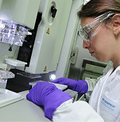 With more than 12 million new cases of cancer diagnosed every year, and 7.6 million* people dying annually fighting cancer-causing infections is an important challenge for humanity.
With more than 12 million new cases of cancer diagnosed every year, and 7.6 million* people dying annually fighting cancer-causing infections is an important challenge for humanity.
The fraction of these cancers which can be attributed to each of the chronic infections caused by hepatitis B (HBV) and C viruses (HCV), the human papillomaviruses (HPV) and Helicobacter pylori, is around 5%.
These infections are the most important causes of major types of cancer, including hepatocellular carcinoma, cervical cancer and stomach cancer, respectively.
The impact of these cancers varies from region to region. Certain chronic infections are a bigger threat in developing countries than in the industrialized world (where only 16% of the world population resides).
Vaccine researchers now have these infections in their sights, opening up the possibility of reducing the burden of infection-associated cancers. In some cases the aim is to prevent infection; in other cases ‘therapeutic vaccines’ could be used to stop the spread of the cancer.
Of course, this is not just about the future. We have already seen considerable success with anti-HBV and anti-HPV vaccination programmes. The latter has been designed with the specific goal of preventing HPV-associated cancers, which is an outstanding breakthrough in cancer prevention.
The prospect has emerged of using vaccinations not only for the primary prevention of cancers but also to treat cancer-causing infections and perhaps even eradicate the pathogen.
An important role is also played by secondary prevention – such as Pap tests and DNA testing for HPV-associated cervical cancers – and by tertiary prevention like anti-angiogenesis in Kaposi’s sarcoma.
So there has been plenty of good news in the battle against cancer, and there is reason for optimism about future developments in this area.
However, further advances are needed to discover new infection-associated cancers; to unlock the mechanisms underlying the relationship between these infections and cancer; and to develop new strategies that may be applied on a large scale, especially in developing countries, for the prevention of both infectious diseases and cancer.
Dr Paolo Bonanni is Director of Public Health, at the University of
Florence.
This article is based on a review published in the journal Carcinogenesis, co-authored with Dr Silvio De Flora, Department of Health Sciences, University of Genoa
Reference: Carcinogenesis vol.32 no.6 pp.787–795, 2011
* Figures adapted from WHO Cancer Fact sheet N°297 February 2011, Globocan 2002 and Globocan 2008





VaccinesToday (@VaccinesToday) (@VaccinesToday) (@VaccinesToday)
October 3rd, 2011
Guest post: Preventing cancer-causing infections http://t.co/XsB2jGWf via @vaccinestoday
VaccinesToday (@VaccinesToday) (@VaccinesToday)
October 17th, 2011
‘Why more than a third of cancers could be caused by viruses’ http://t.co/AwU3I3px via @LifestyleAOL > Reminds me of http://t.co/XsB2jGWf